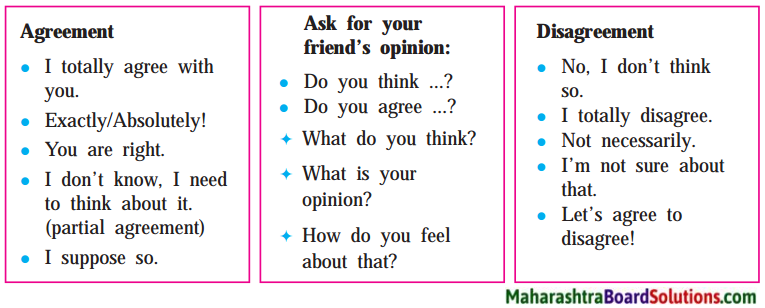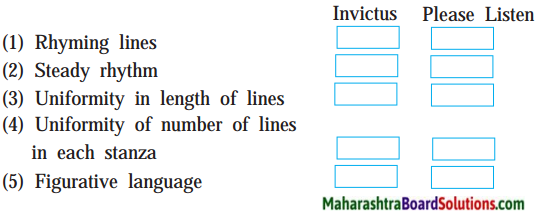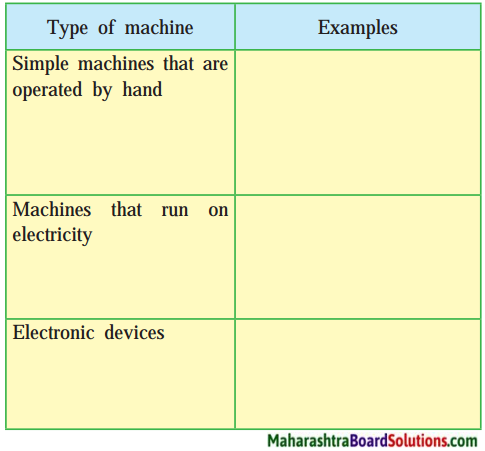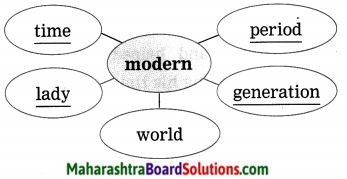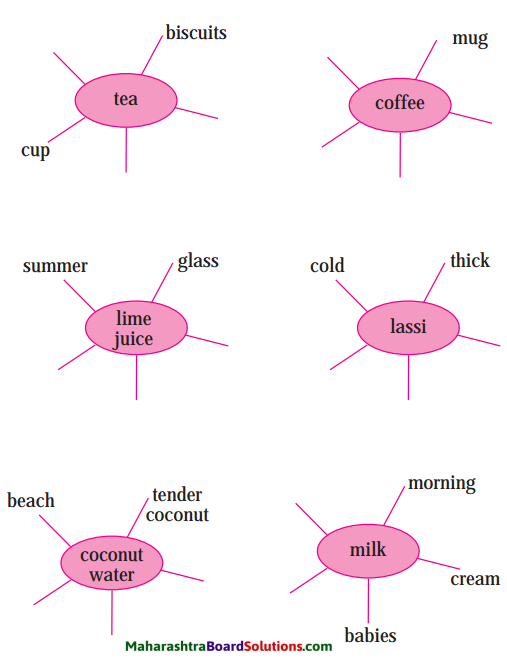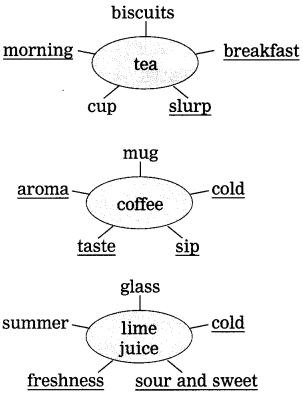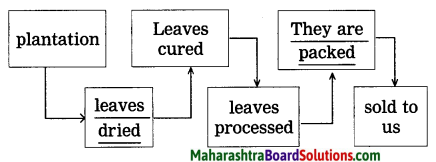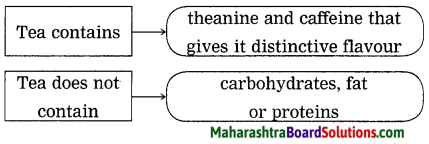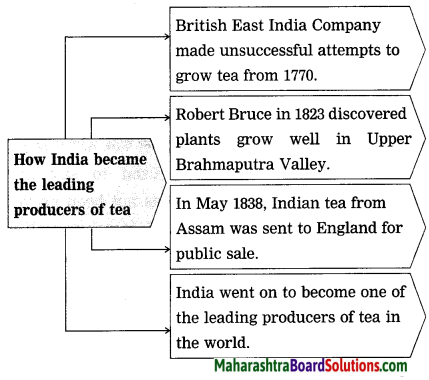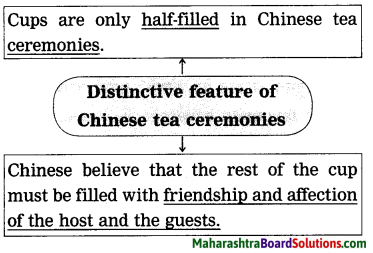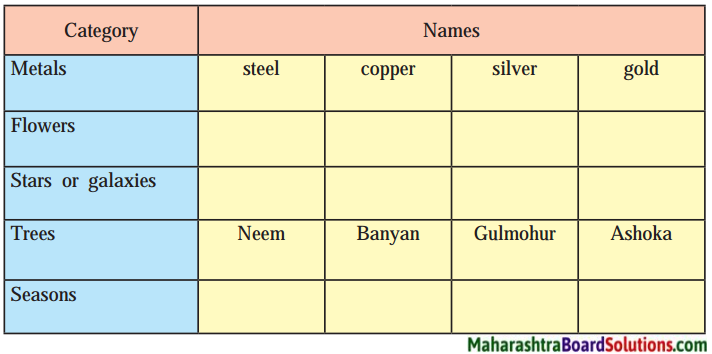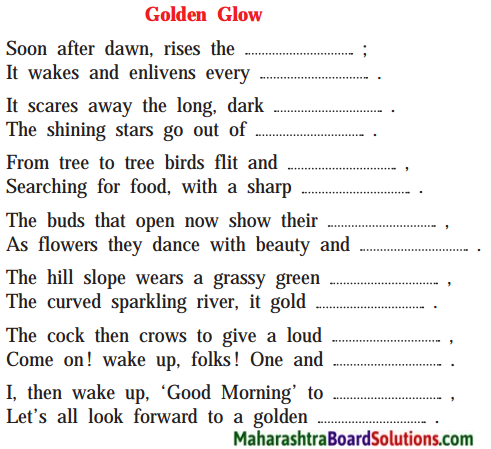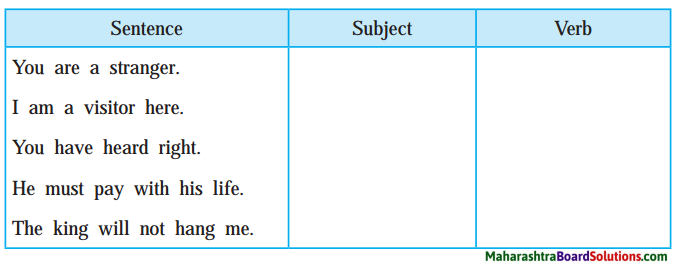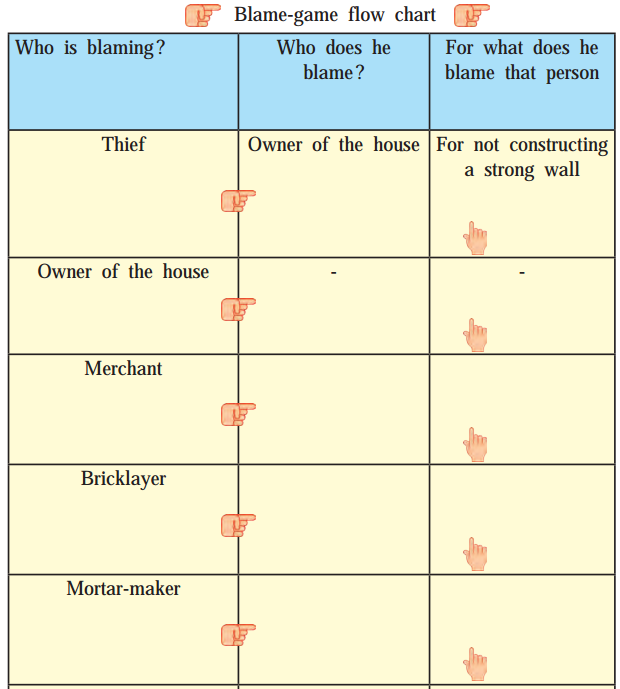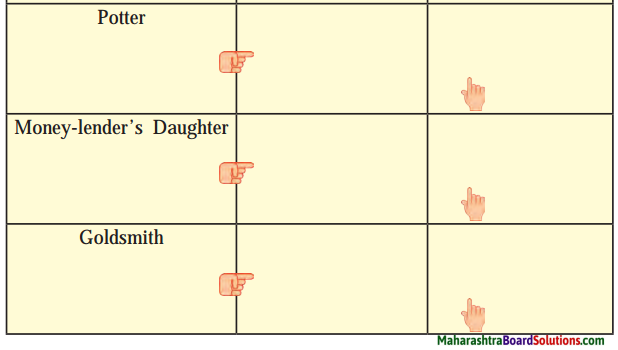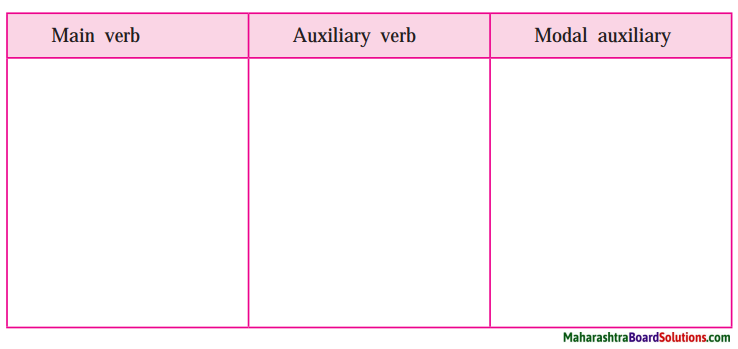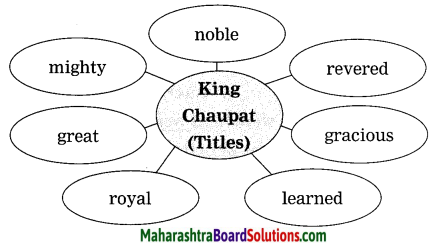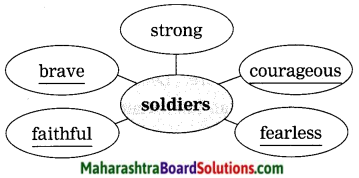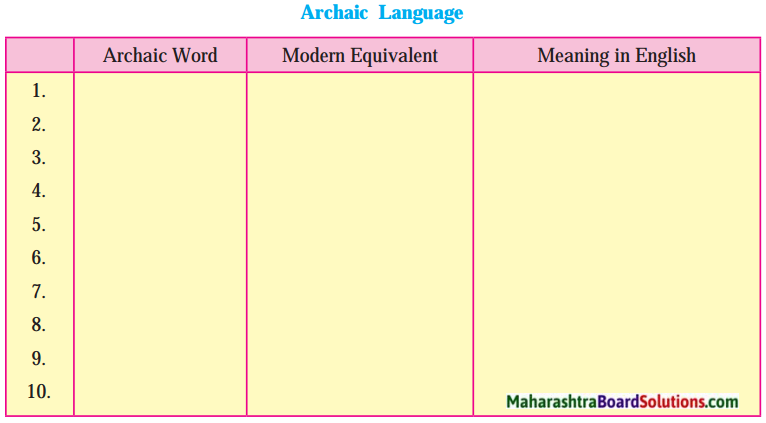Class 9 English Chapter 1.5 Question Answer Maharashtra Board
Balbharti Maharashtra State Board Class 9 English Solutions Kumarbharati Chapter 1.5 The Necklace Notes, Textbook Exercise Important Questions and Answers.
The Necklace Poem 9th Std Question Answer
English Kumarbharati 9th Solutions Chapter 1.5 The Necklace Textbook Questions and Answers
Warming up :
Talking About Myself :
1. Write a few lines about yourself – your name, appearance, family, the place where you live, your school, your friends, neighbours, relatives, your likes, dislikes, hobbies, what you are good at, etc.
Now create an imaginary ‘persona’ for yourself. It can be quite different from your real self. Or, you may choose a fictional character – a character from a novel, story, etc. Write a few lines about this imaginary persona and introduce yourself in that role.
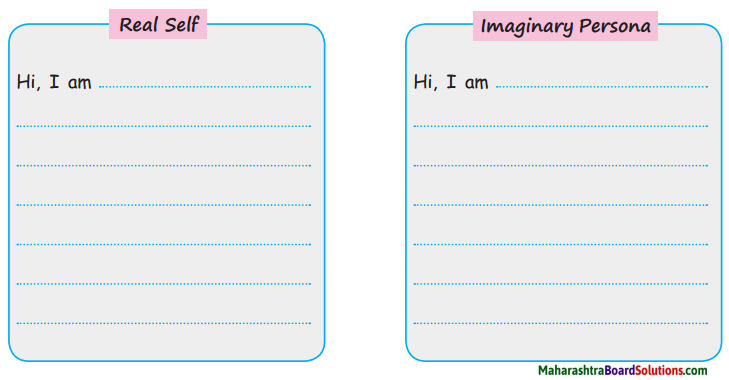
Question 1.
Write a few lines about yourself – your name, appearance, etc. Then create an imaginary ‘persona’ for yourself. It may be quite different from your real self. Or you may choose a fictional character and introduce yourself in that role.
(Only a few lines have been given here. Students can expand the paragraphs as they wish.)
Answer:

![]()
My Dream Possession :
Is there something that you would like to own more than anything else? Describe your dream possession with the help of the following points. You may add your own points, too.
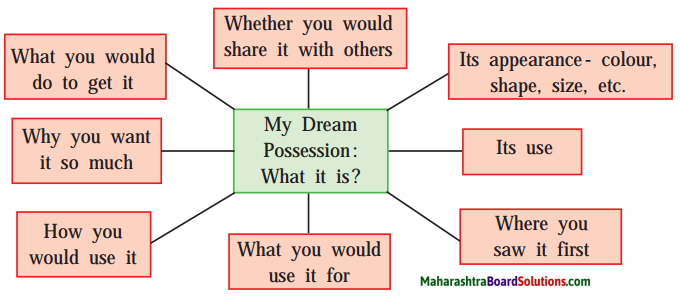
Question 1.
Is there something that you would like to own more than anything else? Describe your dream possession with the help of the following points. You may add your own points, too.
Answer:
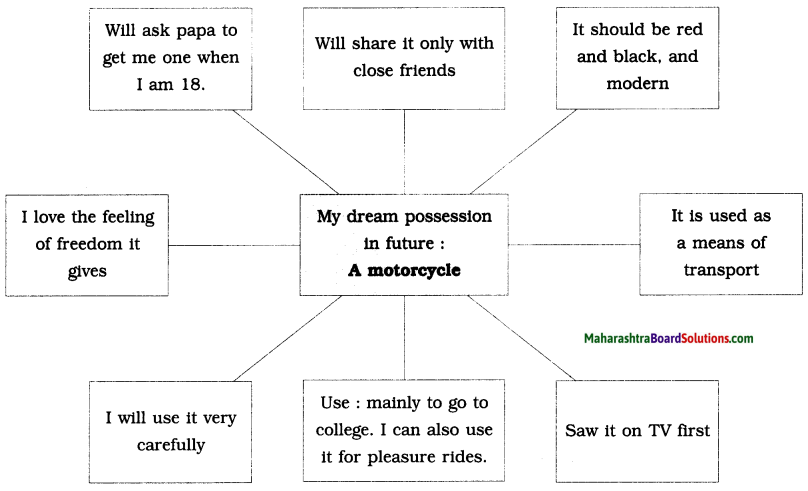
Part – I
English Workshop :
1. Read each of the following sentences aloud. Write who said it and to whom.
(a) “Look, here’s something for you.”
(b) “Why, the dress you go to the theatre in!”
(c) “I would rather not go to the party.”
(d) “Choose, my dear.”
(e) “You have nothing else?”
(f) “Would you lend lue this, just this?”
(g) “What ! … how ! … That’s impossible!”
Question a.
“Look, here’s something for you.”
Answer:
Mathilde’s husband said this to Mathilde.
Question b.
“Why, the dress you go to the theatre in!”
Answer:
Mathilde’s husband said this to Mathilde.
![]()
Question c.
“I would rather not go to the party.”
Answer:
Mathilde said this to her husband.
Question d.
“Choose, my dear.”
Answer: Madame Forestier said this to Mathilde.
Question e.
“You have nothing else?”
Answer:
Mathilde said this to Madame Forestier.
Question f.
“Would you lend me this, just this?”
Answer:
Mathilde said this to Madame Forestier.
![]()
2. Write a few lines about what Mathilde had and what she dreamt about.
Question 1.
Write a few lines about what Mathilde had and what she dreamt about.
Answer:
Mathilde had plain dresses and a shabby, poorly furnished house. She dreamt of a grand. palatial mansion, with vast rooms and inviting smaller rooms, perfumed for afternoon chats with close friends.
3. Write what you think about the following thoughts and actions of Mathilde.
(a) Mathilde was beautiful, and so she wanted to marry an aristocrat.
(b) Mathilde was sad because she did not get any luxuries.
(c) Mathilde felt that her house was shabby and poorly furnished.
(d) Mathilde wanted other people to envy her.
(e) Mathilde was not happy to see the invitation.
(f) Mathilde wanted a new dress for herself.
(g) Mathilde borrowed a diamond necklace from her friend and wore it to the party.
(h) Mathilde lost the necklace.
Question a.
Mathilde was beautiful and so she wanted to many an aristocrat.
Answer:
I think that this is a natural but childish wish. What Mathilde does not realize is that happiness does not lie in money or status. It depends on the character of a person.
![]()
Question b.
Mathilde was sad because she did not get any luxuries.
Answer:
I feel sympathetic towards Mathilde. Everyone wants luxuries, but not everyone can get them. Mathilde should have realized this and been content with whatever she had. She should have tried to improve her living conditions in some way.
Question c.
Mathilde felt that her house was shabby and poorly furnished.
Answer:
This shows Mathilde’s inability to deal with reality. Mathilde should have tried to make the house a home by keeping it clean and doing things with love, instead of looking at the material things that were there.
Question d.
Mathilde wanted other people to envy her.
Answer:
This is a very natural feeling. To some extent, we all want others to admire and envy us; but Mathilde should have kept this feeling under control.
![]()
Question e.
Mathilde was not happy to see the invitation.
Answer:
This Is a natural reaction on her part, for she wanted to be well-dressed and look pretty when she went to an important party. However, she should not have disappointed her husband by immediately showing her unhappiness. She could have later presented her case less bluntly.
Question f.
Mathilde wanted a new dress for herself.
Answer:
Mathilde was young and pretty and wanted new things. But she should have first asked her husband what he had saved the money for, and then decided what was more important – her dress or his gun. He was very generous and she should also have shown some genuine consideration.
Question g.
Mathilde borrowed a diamond necklace from her friend and wore it to the party.
Answer:
Mathilde should not have borrowed such an expensive necklace just to show off. One should never borrow expensive things from others.
![]()
Question h.
Mathilde lost the necklace.
Answer:
Mathilde was very thrilled by her own triumph at the party. She forgot everything in the revelry. In my opinion, she should have taken care and not been so Irresponsible, especially when she was wearing borrowed jewels.
4. Prepare a formal invitation using the following format:
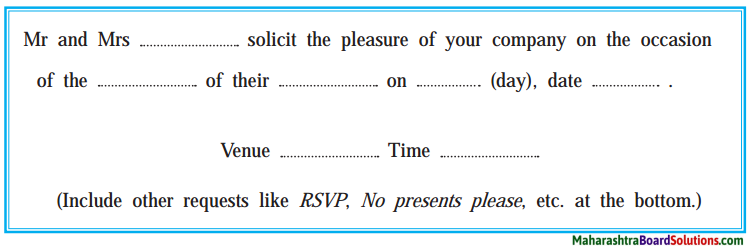
Question 1.
Prepare a formal invitation using the format given on page 21 of the textbook.
Answer:

![]()
5. Read the following :
- The necklace
- an error
- all these things
- another woman
- one evening
- her husband.
1. In all these phrases we see some words used before the nouns.
2. They specify or make it clear what noun we are talking about. These words that are used at the beginning of a noun phrase are known as determiners.
3. Determiners include articles (a, an, the), possessive pronouns (my, our, your, her, etc.), demonstratives (words like this, that), quantifiers (much, many, etc.), numerals, etc.
4. Write your phrases using each of type of determiner.
Question 1.
Write your own phrases using the possessive pronouns ‘my’, ‘his’ and ‘your’.
Answer:
my daughter, his clothes, your umbrella
Question 2.
Write your own phrases using the articles a, an, the.
Answer:
a house, a flower, an invitation, an enquiry, the Arabian Sea, the Himalayas
Question 3.
Write your own phrases using the ; demonstratives (this, that, these, those) :
Answer:
this tree, that building, these flowers, those hills.
![]()
Question 4.
Write your own phrases using the following quantifiers :
1. much
2. many
Answer:
1. much trouble, much hope
2. many apples, many trees
Part – II
1. Complete the following table.
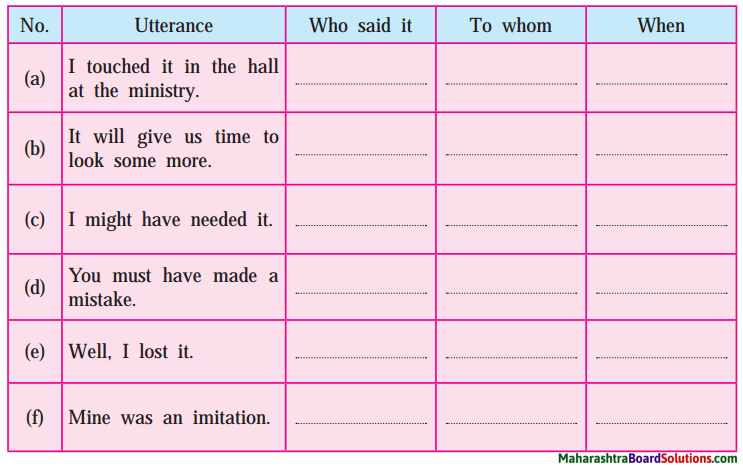
Question 1.
Complete the following table.
Answer:

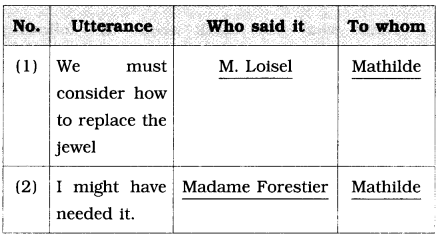

2. Write what you think about the following thoughts and actions of Mathilde :
Question a.
Mathilde despaired over the loss of her necklace.
Answer:
Mathilde was frightened that she had lost a j valuable necklace and she would have to replace it. She realised her mistake in borrowing such a valuable jewel. Anyone else in her place would have felt the same.
![]()
Question b.
Mathilde wrote a note to her friend as dictated by her husband.
Answer:
I think that Mathilde realized her foolishness and was now willing to listen to whatever her husband i said to make good the loss of the necklace.
Question c.
Mathilde and her husband decided to replace the necklace.
Answer:
Yes, that was the right thing to do, for Mathilde had borrowed the necklace. Madame Forestier had been generous to give it. Mathilde could not allow her friend to suffer a loss because of her foolishness.
Question d.
Mathilde returned the diamond necklace to her friend.
Answer:
There was no other option for her under the circumstances. Mathilde was foolish but honest. She also had enough pride not to want to be in debt.
![]()
Question e.
Mathilde did not tell her friend about the loss and the replacement.
Answer:
I think that Mathilde was proud and did not want to accept her carelessness in front of her friend.
Question f.
Mathilde worked very very hard to pay the debt.
Answer:
I appreciate Mathilde for working very hard even though she did not like it. She did this in order to pay off the debt which she had got into because of her foolishness in borrowing the necklace.
Question g.
Mathilde and her husband paid off the debt in ten years.
Answer:
I respect both Mathilde and her husband for working so hard for so many years, and living in poverty in order to pay off the debt. They did not take any easy way out.
![]()
Question h.
Mathilde told her friend about the lost necklace.
Answer:
Maybe it was a foolish action on Mathilde’s part. Mathilde will now feel terrible when she knows that she wasted ten years of her life struggling to replace the imitation necklace.
3. Form pairs. Discuss how ‘Part II’ of the story could have been different. Write your storyline in the form of bullets showing the main events.
Question 1.
Form pairs. Discuss how ‘Part II’ of the story could have been different. Write your storyline in the form of bullets showing the main events.
4. Imagine what must have happened after Mathilde’s friend discovered that the diamonds were real. Do you think she would return the necklace to Mathilde? Would that make Mathilde happy?
Question 1.
Imagine what must have happened after Mathilde’s friend discovered that the diamonds were real. Do you think she would return the necklace to Mathilde? Would that make Mathilde happy?
Answer:
Mathilde’s friend, Madame Forestier, has been shown to be a kind-hearted and generous woman. She was also rich. So she would have probably returned the necklace to Mathilde. Mathilde, proud but greedy, would probably have taken it and been happy. But she would have been unhappy over the lost years of her youth.
![]()
5. Discuss the following and write about each in your own words in 5-6 lines.
(a) What would you do, if something like this happens to you?
(b) What opinion do you form about Mathilde’s husband from her story?
(c) Which events in the story (Part I and Part II) changed Mathilde’s life?
Question 1.
Discuss the following and write about each in your own words in 5-6 lines.
(a) What would you do, if something like this happens to you?
(b) What opinion do you form about Mathilde’s husband from her story?
(c) Which events in the story (Part I and Part II) changed Mathilde’s life?
6. Read, recall and remember. Read the table of verb forms given below.
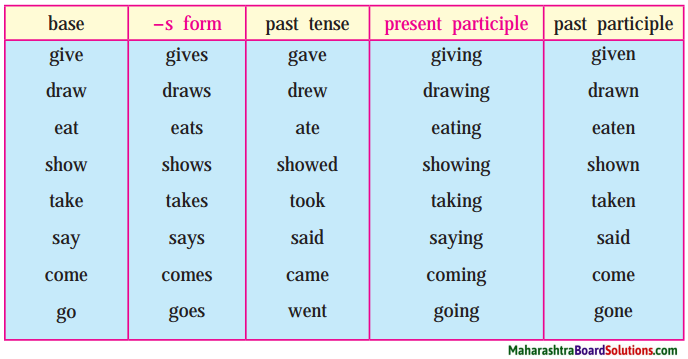
The base form is used as an infinitive: You may go. She will go, in orders: Go home; and in the simple present tense: I go to school. We go home. Do you go there every day? The children/They go up, etc.
Note that we use the ‘-s form’ with ‘he’, ‘she’, ‘it’, third-person singular subjects to show the simple present.
The past tense form has ‘-ed’ at the end. But many commonly used verbs have different past tense forms.
Examples: came, went, spoke.
The ‘-ing’ form is known as the present participle. It is used with forms of ‘be’ to show continuous action
Examples: I am eating You were eating She was eating It is also used in certain constructions like He sat copying a manuscript.
The past participle used with forms of ‘have’ shows completed action –
Examples: I have eaten. They have come, etc.
It is also used in certain constructions like ‘They looked at each other, stunned! It is also used in passive constructions.
(a) Make a table of verb forms for your own reference. Try to arrange the verbs in alphabetical order. Keep adding new verbs to your table from time to time. When you write, check your work to see whether you have used the correct verb form.
(b) List at least 10 verbs, the last letter of which is doubled in the present participle.
Example: put – putting
(c) List at least 10 verbs, the last letter of which is doubled in the past participle.
Example: write – written
(d) List at least 10 verbs, the last letter of which is doubled in the past tense form.
Example: sob – sobbed.
![]()
7. Read: ‘The Gift of the Magi’ by O. Henry.
Question 1.
Read: ‘The Gift of the Magi’ by O. Henry.
English Kumarbharati 9th Digest Chapter 1.5 The Necklace Additional Important Questions and Answers
Read the following passages carefully and complete the activities:
Simple Factual Activity:
Question 1.
Write whether the following statements are True or False:
Answer:
- Mathilde was born into a rich family. False
- Mathilde was content with what she had. False
- Mathilde had no rich dresses or jewels. True
- Mathilde was wedded to an aristocrat. False
Complex Factual Activity:
Question 1.
Why was Mathilde married to a ‘minor official’?
Answer:
Mathilde, a pretty and charming girl, was born into a family of clerks. She had no means of becoming known, understood, loved or be wedded to an aristocrat. So she was married to a ‘minor official’,
![]()
Question 2.
Why did Mathilde weep with misery after visiting her schoolmate?
Answer:
Mathilde had no rich dresses and no jewels, and these were the only things she loved. She found that her schoolmate, who was rich, had all the things that she, Mathilde, wanted so desperately. Hence, she wept with regret, despair and misery after visiting her schoolmate.
Activity-based on Vocabulary :
Question 1.
Match the following nouns with their adjectives :
| A | B |
| 1. minor | (a) house |
| 2. shabby | (b) mansion |
| 3. palatial | (c) friends |
| 4. close | (d) official |
Answer:
| A | B |
| 1. minor | (d) official |
| 2. shabby | (a) house |
| 3. palatial | (b) mansion |
| 4. close | (c) friends |
![]()
Activities based on Contextual Grammar:
Question 1.
She dreamed of a grand, palatial mansion. (Frame a wh-question to get the underlined words as the answer.)
Answer:
What did she dream of?
Question 2.
She suffered because of her shabby house. (Rewrite using the noun form of the underlined word.)
Answer:
Her suffering was because of her shabby house.
![]()
Personal Response :
Question 1.
Is anyone entitled to all the luxuries of life due to reasons of birth or other innate qualities?
Answer:
No, I don’t think that a person is entitled to all the luxuries of life due to reasons of birth or other innate qualities. A person must work hard to acquire the luxuries and not get them just because of his birth. Only when he/she works hard will he/she I know the real value of things.
Complex Factual Activity :
Question 1.
What did the envelope hold?
Answer:
The envelope held an invitation for a party at the Ministry of Education.
Question 2.
Was the husband a considerate person? How do we know that?
Answer:
The husband was very happy to give Mathilde the invitation to the party for he felt that she would be pleased. When she began to cry, he was distressed to see her tears. When he realized that she wanted to buy a dress for the party, he sacrificed the money he had saved to buy himself a gun for a hunting summer with friends. He gave her the money for her new dress. This shows that the husband was a considerate person.
![]()
Activity-based on Vocabulary :
Question 1.
Match the words with their meanings :
| A | B |
| 1. triumph | (a) shocked |
| 2. computing | (b) stammered |
| 3. stunned | (c) calculating |
| 4. stuttered | (d) victory |
Answer:
| A | B |
| 1. triumph | (d) victory |
| 2. computing | (c) calculating |
| 3. stunned | (a) shocked |
| 4. stuttered | (b) stammered |
Activities based on Contextual Grammar :
Question 1.
He hadn’t thought of that.
(Add a question tag.)
Answer:
He hadn’t thought of that, had he?
![]()
Question 2.
One evening her husband came home with an air of triumph.
(Replace the underlined phrase with an adverb.)
Answer:
One evening her husband came home triumphantly.
Complex Factual Activities :
Question 1.
Why did Mathilde go to her friend’s house and tell her of her distress?
Answer:
Mathilde wanted to have jewellery to wear for the party. She did not have any, but she knew that her friend was rich and would have a good collection of jewels. So she went to her friend’s house and told her of her distress so that she could borrow some jewellery from her.
Question 2.
What did Madame Forestier’s large box contain?
Answer:
Madame Forestier’s large box contained jewellery.
![]()
Question 3.
Which sentences tell us that Mathilde greatly desired the necklace?
Answer:
The following sentences tell us that Mathilde greatly desired the necklace :
- Her heart began to beat with uncontrolled desire. Her hands trembled as she took it. She fastened it around her neck and stood lost in ecstasy.
- Then she asked anxiously, hesitating, “Would you lend me this, just this?”
- She threw her arms around her friend’s neck rapturously, then fled with her treasure.
Activities based on Vocabulary :
Question 1.
Write down two adjectives from the passage that describe Mathilde :
Answer:
sad, restless (anxious, strange).
![]()
Question 2.
Write down the adjective forms of:
- ecstasy
- fashion.
Answer:
- ecstasy – ecstatic
- fashion – fashionable.
Activities based on Contextual Grammar :
Question 1.
She kept asking, “You have nothing else?” (Rewrite as an affirmative sentence.)
Answer:
She kept asking, “Is this all you have?”
Question 2.
“You’ve been acting strange these last three days.” (Rewrite as a negative sentence.)
Answer:
“You’ve not been acting normally these last three days.”
Personal Response :
Question 1.
Try to express the thoughts that must have passed through Mathilde’s mind on seeing the necklace?
Answer:
On seeing the necklace, Mathilde must have thought: “Oh, how beautiful I will look with these diamonds round my neck I will be the prettiest woman at the party. All the others will crowd round me and admire me. I will be the most elegant and gracious woman there. Everyone will envy me!”
![]()
Simple Factual Activity :
Write who said the following sentences and to whom :
Question 1.
“What! … how! … That’s impossible!”
Answer:
Mathilde’s husband said this to Mathilde.
Question 2.
“What’s the matter?”
Answer:
Mathilde’s husband said this to Mathilde.
Complex Factual Activity :
Question 1.
Why did Mathilde not notice the loss of her necklace earlier? ;
Answer:
Mathilde was a great success at the party. She was full of joy for she was prettier than all the other women. She danced wildly, with passion, forgetting everything in the triumph of her success, floating in a cloud of happiness. In all this excitement, she did not notice the loss of her necklace.
Activities based on Vocabulary :
Question 1.
Pick out four adverbs ending in ‘-ly’ from the passage.
Answer:
wildly, finally, sadly, suddenly.
![]()
Question 2.
Write the adverb forms of the following :
- pretty
- elegant
- gracious
- impossible
Answer:
- prettily
- elegantly
- graciously
- impossibly.
Activities based on Contextual Grammar :
Question 1.
Rewrite the following conversation in Indirect Speech :
“You could wear flowers,” he said. “They are very fashionable at this time of the year.”
Answer:
He said that she could wear flowers, and s that they were very fashionable at that time of the year.
Question 2.
She threw her arms round her friend’s neck.
(Pick out the subject and predicate.)
Answer:
Subject – She
Predicate – threw her arms round her friend’s neck.
Language Study Activities
(based on vocabulary and grammar)
Simple Activities :
Question 1.
Write two compound words of your own.
Answer:
daydream, candle-stick
![]()
Question 2.
Make a meaningful sentence using the phrase ‘with an air of triumph’
Answer:
The magician drew out a rabbit from the hat with an air of triumph.
Question 3.
Spot the error and correct the sentence :
You’ve be acting strange these last three days.
Answer:
You’ve been acting strange these last three days.
Question 4.
Pick out the infinitive from the given sentence :
He had been saving that exact amount to buy a gun.
Answer:
to buy
Question 5.
Identify the type of sentence :
What is the matter?
Answer:
Interrogative sentence
![]()
Question 6.
Pick out the word that cannot be formed using the letters of the given word :
fashionable – fashion, blush, sheaf, shine
Answer:
blush
Question 7.
Form a present participle in which the last letter is doubled.
Answer:
control – controlling
Question 8.
Write the following words in alphabetical order :
stuttered, treasure, strange, tormented.
Answer:
strange, stuttered, tormented, treasur
Question 9.
Make a word chain of 4 adjectives : charming →
Answer:
charming → gracious → sad → delicate → elegant.
![]()
Medium-Level Activities :
Question 1.
Mathilde saw some bracelets. (Use simple future tense of the verb.)
Answer:
Mathilde will see some bracelets.
Question 2.
She threw the invitation on the table. (Change the voice beginning ‘The invitation ’.)
Answer:
The invitation was thrown on the table by her.
Question 3.
One evening her husband said to her, “What’s the matter?” (Rewrite using indirect speech.)
Answer:
One evening her husband asked her what the matter was.
Challenging Activities :
Question 1.
When they were finally in the street, they could not find a cab.
(Pick out the clauses and state the type.)
Answer:
they could not find a cab – Main Clause, when they were finally in the street – Subordinate clause.
![]()
Question 2.
“Would you lend me this, just this?”
(Pick out the modal auxiliary and state the function.)
Answer:
would – permission
Complex Factual Activity :
Question 1.
What efforts did Loisel make to find the necklace?
Answer:
Loisel and Mathilde searched through her clothes to find the necklace. But they could not find it. Then Loisel went out and walked back over the whole route they had taken to see if he could find it. He went to the police, to the newspapers to offer a reward, to the cab companies, and everywhere that the tiniest glimmer of hope led him.
Question 2.
What was the arrangement with the jeweller? Do you think it was fair?
Answer:
Madame and M. Loisel found the string of diamonds they were looking for. The price was thirty- six thousand francs. They needed time to raise that much money, and they pleaded with the jeweller not to sell it to anyone for three days. They made an arrangement that the jeweller would buy it back for thirty-four thousand francs if the other necklace was found before the end of February. Yes, I think the deal was quite fair.
![]()
Question 3.
Why did Madame Forestier speak coldly to Mathilde?
Answer:
Mathilde had returned the borrowed necklace after a long delay. Madame Forestier felt that she should have returned it sooner for she, Madame Forestier, might have needed it. She probably felt that Mathilde had taken advantage of her goodness and hence spoke coldly to her.
Activities based on Vocabulary :
Question 1.
What is implied in the expression ‘a hollow, pale figure’?
Answer:
It means an unhappy, exhausted person.
Question 2.
Give the meaning of the following expressions :
1. a glimmer of hope
2. her mind blank.
Answer:
1. a glimmer of hope – a slight chance of success.
2. her mind blank – without having any thoughts.
![]()
Question 3.
Make sentences of your own using the following expressions :
1. lost all hope
2. sick with grief and anguish
Answer:
1. The rescuers have lost all hope of saving the trapped animal.
2. When Meena’s cat died, she was sick with grief and anguish.
Activity-based on Contextual Grammar :
Question 1.
Rewrite the following sentences as compound sentences :
1. They went from jeweller to jeweller, looking for a necklace like the other one.
2. At the end of one week they had lost all hope.
Answer:
1. They went from jeweller to jeweller and looked for a necklace like the other one.
2. It was the end of one week and they had lost all hope.
Simple Factual Activity :
Complete the following sentences :
(The answers are given directly and underlined.)
- The dreadful debt must be paid.
- They rented a garret under the roof.
Complex Factual Activity :
Question 1.
What is meant by the horrible life of the very poor?
Answer:
The horrible life of the very poor means the very difficult and tiring life of the very poor, who have to live in terrible conditions and work extremely hard to make ends meet.
![]()
Activity-based on Vocabulary :
Question 1.
Fill in the blanks with the correct adjectives from the passage :
- ………… life
- ………… labours
- ………….. debt
- ……………. linen
Answer:
- horrible life
- odious labours
- dreadful debt
- dirty linen.
Activity-based on Contextual Grammar :
Question 1.
Rewrite the following sentences as assertive sentences :
1. What would have happened if she had not lost that necklace?
2. How little is needed for one to be ruined or saved!
Answer:
1. She wondered what would have happened if she had not lost that necklace.
2. Very little is needed for one to be ruined or saved.
![]()
Complex Factual Activity:
Question 1.
What contrast is implied by the use of necklace. She wanted to tell her that she had been the word ‘still’ in still young, still beautiful, still through some hard times because of her friend and charming?
Answer:
It means that Mathilde looked old after ten years. while Madame Forestier looked young. beautiful and charming even after ten years.
Question 2.
Why did Mathilde decide to speak to her friend?
Answer:
Mathilde felt emotional. She decided to speak to her friend and tell her the story of the necklace. She wanted to tell her that she had been through some hard times because of her friend and her necklace. She also felt proud that she had tricked her friend and given her not the same necklace she had borrowed but a similar one.
Activity-based on Vocabulary :
Question 1.
Give the noun forms of the following :
- charming
- astonished
- familiarly
- remember
Answer:
- charming – charm
- astonished – astonishment
- familiarly – familiarity
- remember – remembrance.
![]()
Activity-based on Contextual Grammar :
Question 1.
Pick out the main clauses in the following sentences :
1. You say that you bought a diamond necklace to replace mine.
2. One day, as she was walking in the Champs Elysees, she saw Madame Forestier.
Answer:
1. You say – Main Clause.
2. One day she saw Madame Forestier – Main Clause.
Language Study Activities
(based on vocabulary and grammar)
Simple Activities :
Question 1.
Write two compound words from the lesson.
Answer:
newspaper, money-lender.
Question 2.
Punctuate :
she went up to her and said good morning jeanne
Answer:
She went up to her and said, “Good morning, Jeanne.”
![]()
Question 3.
Make a meaningful sentence using the following phrase : before the end of February
Answer:
The snow had vanished before the end of February.
Question 4.
Spot the error and correct the sentence : They was dropped off at their door.
Answer:
They were dropped off at their door.
Question 5.
Use the word ‘stopping’ as a present participle it in your own sentence.
Answer:
Stopping on the way, she bought some groceries.
Question 6.
Identify the type of sentence: Oh, my poor Mathilde!
Answer:
Exclamatory Sentence
![]()
Question 7.
Find out two hidden words from the given word : familiarly
Answer:
familiarly – familiar, family (frail, rally)
Question 8.
Form a past participle in which the last letter is doubled.
Answer:
beg – begged
Medium-Level Activities :
Question 1.
“I’m going back,” he said.
(Rewrite in indirect speech.)
Answer:
He said that he was going back.
![]()
Question 2.
Each month they had to pay some loans. (Change the voice.)
Answer:
Some loans had to be paid each month by them. / Each month some loans had to be paid by them.
Question 3.
Use the word ‘made’ and its homophone in two sentences of your own.
Answer:
(a) The salad was made in the hotel for a special occasion.
(b) Suman always treated her maid with courtesy.
Question 4.
It seemed to be exactly what they were looking for. (Rewrite using the past perfect progressive tense of the underlined verb.)
Answer:
It seemed to be exactly what they had been looking for.
Challenging Activities :
Question 1.
Use the following word in two separate sentences, once as a noun and once as a verb :clasp
Answer:
(a) I lost a valuable bracelet as the clasp was weak, (noun)
(b) I saw the poor woman clasp the doctor’s hands in gratitude, (verb)
![]()
Question 2.
Madame Forestier, astonished to be addressed so familiarly, did not recognize her.
(Rewrite as a compound sentence.)
Answer:
Madame Forestier was astonished to be addressed so familiarly and did not recognize her.
Grammar Focus:
Question 1.
Make a table of verb forms for your own reference. Try to arrange the verbs in alphabetical order. Keep adding new verbs to your table from time to time.
Answer:
(Students may attempt this on their own.)
Question 2.
List at least ten verbs, the last letter of which is doubled in the present participle.
Answer:
sit – sitting, dig – digging, run – running, hit – hitting, knit – knitting, bat – batting, forget – forgetting, jog – jogging, begin – beginning, plan – planning.
![]()
Question 3.
List at least ten verbs, one last letter of S which is doubled in the past participle.
Answer:
bite – bitten, fall – fallen, hide – hidden, rot – rotten, stop – stopped, prefer – preferred, rub – rubbed, slip – slipped, bar – barred, occur – occurred.
Question 4.
List at least ten verbs, the last letter of which is doubled in the past tense form.
Answer:
rob – robbed; knot – knotted, flit – flitted, jog – jogged, tip – tipped, tug – tugged, beg – begged, emit – emitted, rot – rotted, plan – planned.
Maharashtra State Board Class 9 English Solutions
English Kumarbharati 9th Textbook Answers Solutions Unit 1
